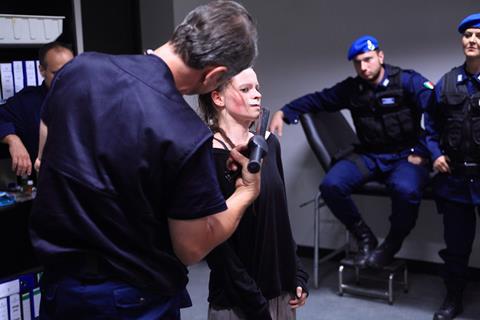Dir: Daniele Vicari Italy-France-Romania. 2012. 127mins

The road to hell is paved with good intentions and there is no better evidence for it than Daniele Vicari’s over-produced, hysterically directed, poorly written fictional recreation of the bloody mess wrecked by Italian law enforcement on the last day of the G8 summit conference in 2001.
Brutality on screen too often risks catering to the wrong kind of audience particularly when shown in such detail and ultimately turning into a freak show.
Wishing to keep the subject alive and ensure that those who have not yet been brought to justice will not be saved by the approaching statute of limitations provided by the Italian law, is certainly an admirable goal. Applying the most hackneyed propaganda tactics to do it, may be counter-productive if not worse.
For anyone who might have forgotten or missed the several documentaries that have already been made about it the 2001 G8 summit convened in Genova, with such notables as George Bush, Jacques Chirac and naturally Silvio Berlusconi, attending. At the same time, protesters from all over the world gathered in the city, claiming out loud that “a different world is possible”.
The police clamped down on the marching protesters, opened fire and killed one of them, Carlo Giuliani (a documentary on this tragedy featured the following year in Cannes). One night later, with demonstrations over and protesters about to leave the city next morning, police broke into the Diaz-Pascoli school, which served as a dormitory for the protesters on their way out, pretending they had information that armed black bloc anarchists are hiding there.
Everybody inside was brutally beaten up, many suffered serious injuries, some were taken to hospital, others, while still bleeding, were dragged for further investigations and beatings at the Bolzaneto police barracks, while the police fabricated evidence to show the media that they had indeed caught potential terrorists carrying weapons and Molotov bottles.
The film’s basic assumption is that all policemen, with an exception or two, are mad maniacs whose unchained sadistic fury is nothing short of pathological, while all protesters are nice kids who want to have some fun, raise some hell but not too much and go home at the end of the day with the feeling they had contributed something to make the world better (again with a few understated exceptions).
As for those in charge of order and security in the land, they are a bunch of bloodthirsty villains who believe force is the only instrument for preserving peace. The generalisations, in this case, are so extreme and one-sided that many will wonder whether they are not being handed a bill of goods, keeping in mind, of course, that all this is a fictional recreation of the event, not documentary footage of what has really happened.
Additionally, for a film that follows the formula of a disaster movie, the script, editing and direction manage to deliver a pretty confusing sequence of the events, moving back and forth in time without warning and using a myriad of characters providing different angles of the story, none of them identifiable or worth remembering.
Claudio Santamaria is the one cop with a conscience; Elio Germano plays a journalist from Bologna wounded by the police; Jennifer Ulrich is a German activist who not only has her face smashed, she is also pointlessly tortured and humiliated, while Nick Janssen is a foreigner who finds himself by accident inside the Diaz school and grabs a few shots of the unchained police before being kicked himself viciously by the law.
Filming in Bucharest, partly because - according to the producers, they wanted to keep their distance from the Italian media, but probably also because a large production such as this would have cost much more in the West - must have had its advantages, but not enough for a production that could have been much humbler in size but much more concise in the treatment.
Brutality on screen too often risks catering to the wrong kind of audience particularly when shown in such detail and ultimately turning into a freak show. The most serious issue here, the suspension of democratic rights in a country that claims to be democratic, and the responsibility of those who took the decisions, it is too easily passed over.
Production companies: Fandango, Mandragora Movies, Le Pacte
Producer: Domenico Procacci
International sales: Fandango Portobello, www.fandangoportobello.com
Screenplay: Daniele Vicari, Laura Paolucci
Cinematography: Gherardo Gossi
Editor: Benni Atria
Production designer: Marta Maffucci
Music: Teho Teardo
Main cast: Claudio Santmaria, Jennifer Ulrich, Elio Germano, Davide Iacopini, Ralph Amoussou, Fabrizio Rongione, Monica Barladeanu







![The Brightest SunScreen[Courtesy HKIFF]](https://d1nslcd7m2225b.cloudfront.net/Pictures/274x183/3/5/0/1448350_thebrightestsunscreencourtesyhkiff_312678.jpg)













